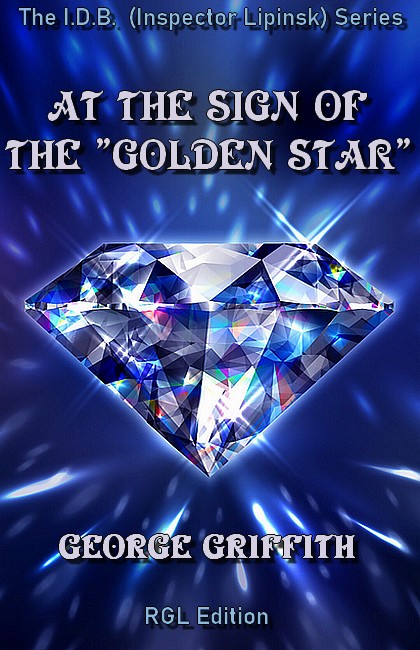
RGL e-Book Cover©
Roy Glashan's Library
Non sibi sed omnibus
Go to Home Page
This work is out of copyright in countries with a copyright
period of 70 years or less, after the year of the author's death.
If it is under copyright in your country of residence,
do not download or redistribute this file.
Original content added by RGL (e.g., introductions, notes,
RGL covers) is proprietary and protected by copyright.

RGL e-Book Cover©

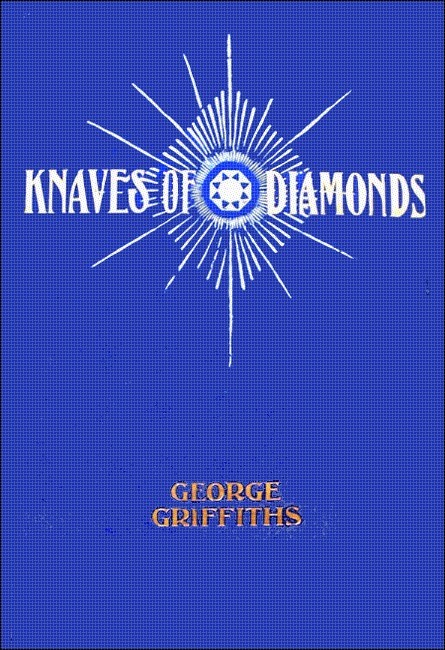
"Knaves of Diamonds," C. Arthur Simpson,
London, 1899
(with author's surname misspelt)
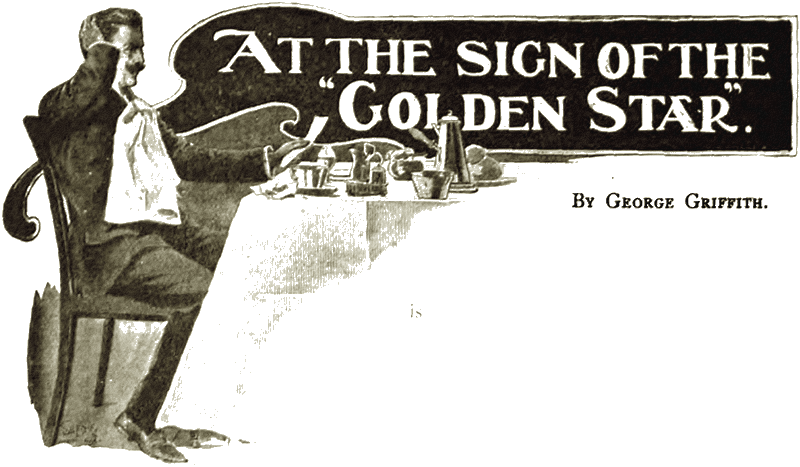
Headpiece from Pearson's Magazine
THE profession of illicit diamond buying* is so intricate, and involves so many varied human relationships that, as may be expected, it often gave, and, indeed, still gives rise to some rather curious situations, of which the experiences of Mr. Ulrich Engstroem, sometime landlord of the "Golden Star" hotel in Kimberley, will, I think, be found to contain one or two of the most singular.
* Commonly called in South Afica I.D.B. It is really the buying of and traffic in diamonds that have been stolen from the mines.
IT all came about through Mr. Immanuel Herman, licensed diamond broker, not sticking to the legitimate branch of his fairly lucrative business. As had often befallen others of his kind, he was one day tempted by the sight of a large parcel of very fine illicit diamonds, and, as the price asked was ridiculously small in comparison with their intrinsic value, he fell. He had kept the stones for several months in close hiding, not even divulging the fact of their existence to his own wife, until at length he felt safe in coming to the conclusion that, with proper precautions, he could get them out of the country without risk.
All this time he had failed to detect the slightest sign of any suspicion on the part of the authorities with regard to himself, although that fact of itself was no real proof that the vigilant eye of Inspector Lipinski, chief of the Detective Department, was one whit the less wide awake than usual, and, about six months after Mrs. Michael Mosenstein, a well-known leader of Semitic society in Kimberley, had gone down to Cape Town en route for England with a pair of hollow heels worth about £30,000 on her French boots, he thought he couldn't do better than try the same game himself.
Consequently, he broached the ever-welcome topic of a trip to Europe to his good lady, and she very naturally fell in with it at once, and was all the more pleased when her husband, in the goodness of his heart, suggested that her sister, Miss Myra Schamyl, who was living with them, should go with her for company's sake. It was this piece of extra and quite unnecessary generosity that brought all the trouble about.
A few days before the time fixed for Mrs. Herman's departure, her husband was called away on quite legitimate business to the then recently opened Jägersfontein mine, in the Free State, and as this business would keep him until after she had gone, he confided the precious packet to her care, the last thing before leaving, with many earnest injunctions to keep its possession an absolute secret until she placed it in the hands of its consignee in Hatton Garden.
Unhappily, however, Mrs. Herman saw no harm in sharing with her sister the feminine luxury of a good gloat over the delightful contents of the package. They had let their house in Currey Street, and were staying for a few days at the "Golden Star."
It was after dinner on the day of Mr. Herman's departure, and after most of the things had been cleared off the dining-table in their private room, that Mrs. Herman took the packet out of the breast of her dress, and opened it before the wondering and admiring eyes of Miss Myra Schamyl. Then, almost as though the evilly-disposed Fates had been lying in wait for this perfectly natural little act of feminine weakness, at that very instant Inspector Lipinski, with his lieutenant, Tom Ferguson, and a lady assistant, Miss Sarah Billing, entered the hotel armed with a warrant authorising them to search the apartments occupied by Mrs. Herman and her sister, Mr. Herman himself being already in custody at Beaconsfield.
Both Mr. Engstroem, the hotel-keeper, and Mistress Martha, his wife, knew perfectly well what this meant, but Mistress Martha grasped the situation a few moments earlier than her deep-thinking but somewhat slow-witted husband did, and, while the expostulations and explanations were going on, she skipped upstairs to warn her guests, not because she had any particular personal regard for them, but for the simple and sufficient reason that she didn't want any I.D.B.'s caught red-handed on her husband's premises.
Although she knocked at the door, she didn't wait for the usual "Come in." She considered the circumstances sufficiently pressing to warrant her in going in at once. So she went in, and there, leaning over the little table, still covered with the white cloth and still littered with the crumbs and the odds and ends of the finished dinner, she saw Mrs. Herman and her sister toying with what looked like a lot of little pieces of frosted glass of all colours, from crystal white to dull brown, pushing them about with the ends of their fingers, and turning them over and exchanging whispered admirations of them.
"Ach Gott!" she cried, in a loud, intense whisper, as she closed the door softly behind her. "Vas dere ever anydings more unfortunate! Ladies, dere is dat little teufel Lipinski, mit two of his traps, and one of dem is a woman, coming to search your rooms, on information receift, as dey say. Hark, dere dey are on de stairs! Himmel! there is no time to lose or it is de brison for five—seven years for bot of you. Stop, let me clear de crumbs away. Dat is de only chance."
The two women stared at her in a dumb paralysis of sudden terror, as she rapidly removed the one or two articles remaining on the table, and then whisked the cloth off with a swift, deft movement, tucked it in a baggy bundle under her arm, and walked towards the door, saying as she went:
"Go to your rooms quickly before dey come."
As they disappeared through the door leading to their bedrooms, Mrs. Engstroem opened the other door and walked calmly downstairs. She met the inspector and his companions half-way up, and stopped in front of them.
"Good afternoon, inspector! Who might you vant?" she said good-humouredly, planting herself in front of the little man so as to gain a few more moments for her guests. "I hope dis is not vat you vould call a professional visit?"
"I'm afraid it is, Mrs. Engstroem," replied the inspector, as he made an attempt to edge past the portly form which almost filled the rather narrow staircase. "The fact is, we want to see Mrs. Herman and that charming sister of hers, and we've got to do it. Are they upstairs?"
"I beliefe so," she said. "I've just been clearing the table; but I dink dey vere in der rooms getting ready to go out. If you like I vill go ant see."
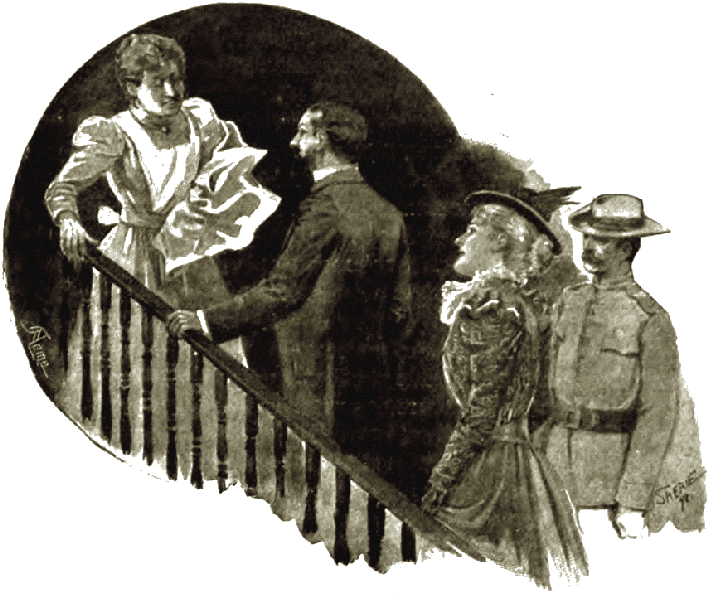
"I beliefe so," she said. "I've just been clearing the table."
"Thank you!" said the inspector. "If you will, we'll follow you. I'm afraid I shall have to ask them to put their walk off for a little, but I won't have them put to any more inconvenience than is absolutely necessary."
"Oh, I'm sure you von't do dat, Mr. Inspector," said the lady, as she turned back to lead the way upstairs. "You are alvays a jentleman, though you sometimes do put ladies into awkward positions like dis. Dis way, please."
Then she turned somewhat deliberately and went upstairs again. The bulging table-cloth stuck out in white billowy folds between her left arm and her side, and Mr. Lipinski's keen, professional nose was within six inches of between ten and twelve thousand pounds' worth of illicit diamonds, mixed up with crumbs and bits of bread and cheese, for the space of about three minutes. But not even his eyes could see through the thick, starched linen any more than those of his companions could, and so Mrs. Engstroem's little ruse succeeded as completely as its boldness and simplicity deserved to do.
Mrs. Engstroem knocked at the door, and, receiving no answer, went in, followed by the inspector and his assistants. Then she asked them to sit down, and went and knocked at Mrs. Herman's bedroom door. She immediately came back and went downstairs. Shortly after Mrs. Herman and her sister came into the dining-room, naturally looking not a little disturbed, but for all that fairly well recovered from their first attack of terror.
"Well, Mr. Lipinski, may I ask what this means?" said Mrs. Herman, with a quite respectable assumption of outraged virtue. "I think I know this—Dr—person," she went on, with a cold glare at Miss Billing; "so I suppose this is what you call a search visit."
This was a somewhat injudicious speech, seeing that under the circumstances Miss Billing's turn was bound to come later on. She was a pleasant-faced young lady, with a broad brow and a strong chin, and she returned Mrs. Herman's stare with a smile and a little bow, which plainly indicated that she knew it.
"I regret to say that it is so, Mrs. Herman," replied the inspector, with deprecatory politeness. "I may as well tell you at once that your husband was arrested this morning on the Border, and as nothing was found on him we have been driven to the conclusion that a large parcel of diamonds, which we have absolutely traced to his possession, must be either in your keeping or else in your rooms. Our duty, therefore, leaves us no alternative but search. If you wish to see the warrant—"
"No, thank you, inspector," replied Mrs. Herman stiffly. "You needn't trouble about that. If you'll kindly get what has to be done over as quickly as you can, we shall be obliged, as we want to go out."
"With pleasure," said the inspector, rising. "Allow me to introduce Miss Billing to you—one of our lady officers, I am sure you will find that she will perform her not very agreeable task with as much consideration and dispatch as is consistent with her duties."
Miss Billing got up and bowed too, and began to take her gloves off. Mrs. Herman and Miss Schamyl looked uncomfortable but defiant, and the inspector and his lieutenant bowed themselves discreetly out of the room.
Miss Billing seemed to do her work fairly thoroughly, for she took the better part of an hour and a half about it, and when at last she left the two ladies, flushed and indignant, but triumphant withal, she said to the inspector:
"It's no use, sir. I'm afraid they've been too smart for us. I haven't left a possible hole or corner unsearched, and there isn't the trace of a stone about the place."
Mr. Lipinski's face darkened perceptibly as he heard this. It was rather a serious matter to go to such an extreme as the arrest and search of a man and his wife and sister-in-law, to say nothing of searching his rooms and draw blank, but blank it was, and that was all there was to be said about it for the present. It was one of the risks that the Department had to take. It had enormous powers, and when it used them without tangible justification it simply had to pay. In this particular case the inspector's afternoon call cost very close on a couple of thousand pounds—which paid the expenses of the two offended ladies to Europe and left a good balance over.
As soon as the unwelcome visitors were safely off the premises, Mrs. Herman called to Mrs. Engstroem to come up, in order to thank her for the timely aid which had saved them from an enforced substitution of some years' penal servitude for the few months in Europe to which they were looking forward.
As she came into the room, Mrs. Herman went to meet her, holding out her hands, and said to her, with real emotion:
"Oh, Mrs. Engstroem, how can we ever thank you enough for being so quick and clever! They found nothing, and now my husband will have a good action for damages against the Department. You may depend upon it he won't forget you when he makes them pay up."
Mrs. Engstroem didn't take her hands. She only stopped and stared at her with her eyes wide open and her mouth almost so.
"I don't quite know vat you mean, Mrs. Herman," she said, in her slow, stolid voice. "How have I saved you? Vat have I done for you?"
"Done? Why the diamonds, of course!" gasped Miss Schamyl, stricken by the same sudden fear which had already deprived her sister of speech. "The diamonds that you took away in the table-cloth!"
"Young lady," replied Mrs. Engstroem, more stolidly than ever, "I knows nodings about diamonds vich de police come to look for. I am not an I.D.B., and I have no friends dat are I.D.B.'s. I took no stones avay in de table-cloth. Dere vas only crumbs."
"Oh, you wicked woman!" the two burst out together. "You know there were! You've stolen them! Bring them back at once, or—"
"Or you vill go and tell Mr. Lipinski dat I took dem, eh?" interrupted Mrs. Engstroem, without a quaver in her low, thick voice, but with just a little higher colour on her fat cheeks. "So! First you call me an I.D.B. accomplice, and now you say I am a tief. It is goot. Goot! Go and tell de police. Haf me arrested if you like, but get out of my house dis day. I vant no I.D.B's here. You had better go and see if your husband is still in gaol. Goot-bye, I will send you your bill in ten minutes."
With that Mrs. Engstroem, looking the picture of stolid respectability and mildly outraged virtue, turned round and walked heavily out of the room.
MRS. HERMAN and her sister had already paid their passages and booked their berths when this exceedingly unpleasant contretemps happened, and it would have looked distinctly suspicious to try and get their money back, even if there had been any chance of doing so. They, therefore, went at the appointed time, followed by the remorseful reproaches, to put it very mildly, of Mr. Herman, who turned with what consolation he might to the prospects of the action for damages which he at once instituted against the Department.
This gentleman's state of mind with regard to Mr. Ulrich Engstroem and his wife would be somewhat difficult to describe. He knew, of course, that they had his diamonds, and he was equally certain that sooner or later they would make an attempt to get them out of the country. He watched them somewhat as a dog watches another dog who has stolen a bone from him, but beyond watching he dare not go. To give the slightest hint to the police would be to confess to the guilty knowledge of which he was already more than suspected. It would also utterly ruin the prospects of his action.
It was almost agony to him to see them calmly revolving in their circle of ponderous respectability, but he could only suffer in silence. Their stolid cunning gave not the slightest opening through which he could even indirectly point the finger of suspicion at them, and when at length Mr. Ulrich Engstroem was about to start for Cape Town, en route for his native land, "where the death of his father had lately made him heir to a flourishing business," he could only look on in silence, gritting his teeth and almost bursting with the information that it would have ruined him to give.
True, his wounded feelings were somewhat salved a week or two later by the verdict of the Civil Court—on the jury of which there were certainly five well-known I.D.B.'s—which awarded five hundred pounds each for himself, his wife, and his sister-in-law, and let the Department in for something like another five hundred pounds' worth of costs; but, after all, what was that in comparison with the ten or twelve thousand pounds which the perfidious Engstroem would get for the stolen stones in the London or Amsterdam market?
From Kimberley to London, and from thence to Amsterdam, Mr. Engstroem himself had the best of good luck. He got the stones away without exciting the slightest suspicion, and if he had only followed the usual course, and sold them in the rough, all would have been well. But his wife had exacted a solemn promise from him that he would not do anything of the kind. They were her diamonds, she said, and hers they were to remain, with the exception of certain stones, very fine ones, which she graciously presented to him.
He was to have them cut in Amsterdam, and her share was to be made up in a necklace, three stars, and certain rings. With his own he could do as he liked. It was not a very wise stipulation perhaps, and her insisting on him bringing them back to her still less so, but she knew how enormously cutting and setting would enhance their value, and she trusted to the practical impossibility of identifying them after they were cut to avoid suspicion.
Mr. Engstroem had a very good time in Paris and Berlin, while the cutters and polishers of Amsterdam were making his diamonds ready to adorn the ample charms of his expectant spouse. Then, when they were ready, he went and fetched them and took them to Paris to be set. And so at length it came to pass that he found himself on the outward-bound steamer at Southampton, with between twenty and thirty thousand pounds' worth of really magnificent jewellery stowed away in the depths of his portmanteau.
Now it should be mentioned here that Herr Ulrich was a well-set-up and extremely personable man, who, like a good many other South Africans, conducted himself much more en grand seigneur when he was on a trip to Europe than he did as an hotel-keeper in Kimberley. He also considered himself, rightly or wrongly, not a little of a Lothario, and hence he didn't go about telling everyone he met on his travels that he was a married man. Indeed, he was rather inclined to keep the fact pretty closely to himself than otherwise. In the present case, as it happened, it would have saved him a good deal of avoidable annoyance if he had not adhered so strictly to his usual rule, but that was only one of the contingencies that the most virtuous of married men may sometimes overlook.
As soon as the ship's company settled down, he did what every old traveller does—took stock of his fellow-voyagers, and looked about to see whether there were any acquaintances on board. He found none, as it happened, and this fact, although it was by no means displeasing to him at first, turned out in the end to be something of a misfortune in disguise.
When the troubles of the Bay were passed, and each day the sun rose higher over smoother seas, and the ladies began to come up on deck in their tropical toilets, Herr Ulrich, according to his wont under such circumstances, began to look about him for the indispensable wherewithal to the carrying on of an innocent flirtation which would serve to while away the tedium of the lazy life on shipboard.
He found it, after a day or two's prospecting, sitting in a deck-chair which, just as he passed, took a run across the deck, propelled by a sudden roll of the vessel. Of course he took full advantage of the fact of being on the spot, helped the lady to her feet, put the chair back in a safer position, fetched the book which had fallen out of her hand, and then dropped into an unoccupied chair alongside which he had purposely placed that of the fair unknown.
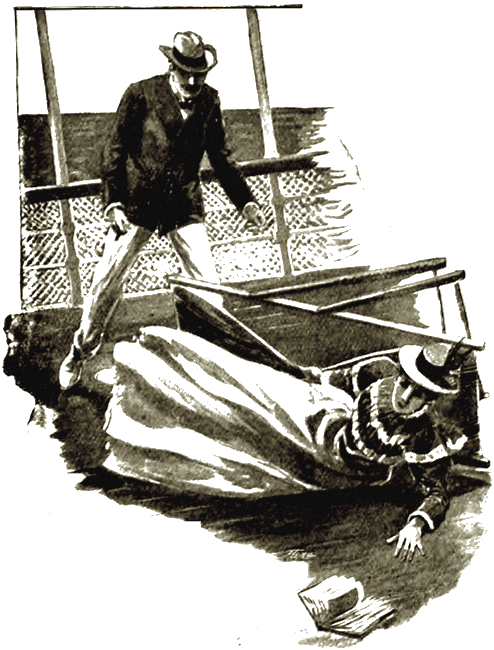
The chair took a run across the deck.
Conversation naturally followed, and, as there is no other place where men and women meet together which offers so fair a field for the development of acquaintance into something else as the deck of a passenger steamer, it was not very long before Mr. Ulrich Engstroem and Miss Frances Colegate found themselves upon terms of promising intimacy, which duly developed as the pleasant, idle days went on.
Miss Colegate was a young lady of excellent preservation but somewhat uncertain age She might have been a girl of twenty-four with an indifferent complexion, or a woman of thirty-five with a good one for that age; but she was stylish, smart, well-informed, and of irreproachable manners. More than this the most exacting man could hardly expect for the purposes of a steamboat flirtation, and Herr Ulrich was amply satisfied. So, too, was the young lady, more so, in fact, than she would have been had she known of the existence of the hostess of the "Golden Star."
To tell the truth, she was one of a class of women not infrequently found on board colonial-bound mail-ships. She had made two or three attempts to get settled in life at home; but, for one reason or another, they had not come off, and so she had wisely decided to try her luck in a land where women were fewer and men less fastidious than they were in the Old Country, while the bloom was still more or less attached to the peach. She confided some of her plans to Herr Ulrich under the guise of asking his advice about South Africa, and in the course of doing so she let fall the fact that she had some private means, and also a few friends scattered about the colony, one, if not more, of whom she expected to meet her at Cape Town.
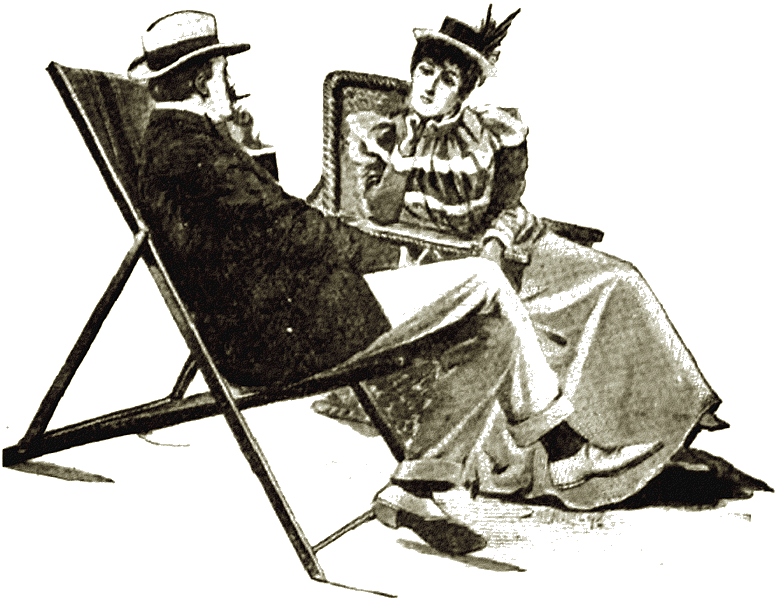
She confided some of her plans to Herr Ulrich.
In exchange for these little confidences, and, it must be admitted, encouraged by certain indefinite, feminine devices, of which Miss Colegate was quite a mistress, Herr Ulrich, if he did not actually commit himself, certainly carried the flirtation to such lengths that the young lady had quite reasonable grounds for supposing that their acquaintance would not end, as nineteen out of every twenty such intimacies do, with the arrival of the ship at her port of destination. Obviously, however, Herr Ulrich had no other intention than that of taking the mail train to Kimberley the night he got in, and cutting the connection short with the usual, "Well, good-bye for the present, I hope we shall meet again before you leave the colony."
But as the ship got nearer and nearer to Table Bay, a rather awkward problem began to press itself upon his attention. So far his expedition had been entirely successful, and very pleasant to boot, but, just as Table Mountain would soon be looming up before his physical gaze, so there began to loom bigger and bigger before his mental vision the awkward fact that, unless he could get his diamonds into the colony unsuspected, the Cape customs officials would inconsiderately insist on the payment of an ad valorem duty of 30 per cent. on them, and that would come to a sum which it would almost break his German Jewish heart to part with.
Many and varied were the schemes that he revolved in his mind towards the end of the voyage, and at last, after a particularly confidential chat one lovely evening after dinner with Miss Colegate, he decided to unbosom himself to her, and ask her aid.
So this he did, and she, when he had found means to show her the treasure and delicately hinted at the possibility of her acceptance of one of the rings under circumstances which she entirely mistook, finally consented to run the risk for the sake of the reward—which she never for a moment doubted might very possibly include a joint ownership of the diamonds.
So it came to pass that when the ship steamed in to Table Bay, Miss Colegate was standing by her friend on the fore-part of the promenade deck, with a small fortune deftly concealed about her person, and gazing with eagerly admiring eyes on the varied splendours of one of the most beautiful seaports in the world. As the vessel neared the clock tower quay at the entrance to the Albert Dock, and the handkerchiefs began to wave, Miss Colegate pulled out hers and said to Herr Ulrich:
"Ah, I thought there would be someone to meet me! There is my cousin, the lady with the green umbrella."
Just then the green umbrella went up, and, with a spasm similar to that which is sometimes produced by a douche of cold water down the back, the landlord of the "Golden Star" recognised Miss Sarah Billing.
His first idea was to go and hide, but that, of course, was absurd. He was bound to see his companion off the vessel. Besides, he could hardly let her walk away with those diamonds just when he had most reason to keep in touch with her, and so in due course the inevitable introduction came off.
Miss Billing looked at him very steadily, and with a not very pleasant smile on her firm lips as she shook hands after embracing her cousin, but she said quite agreeably:
"And so you are back at last, Mr. Engstroem! You've had quite a long trip. How delighted your good wife will be to have you back after such an absence."
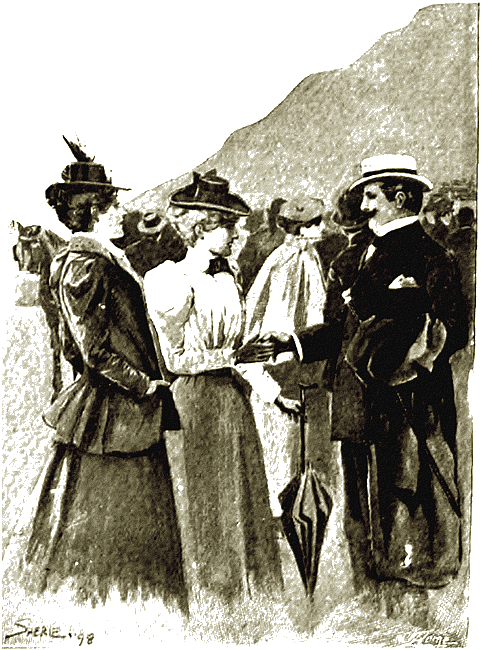
"And so you are back at last, Mr. Engstroem!"
Miss Colegate paled visibly for a moment, and favoured Mr. Engstroem with a quick stare, which made him feel exceedingly uncomfortable; but, with these exceptions, she controlled her feelings admirably, like the astute and experienced young lady that she was, while he covered his confusion by bustling about looking for a cab, cursing the while under his breath the deplorable trick of Fate which had brought this particular person out of all the thousands of women in South Africa to meet and welcome his fellow-voyager. He saw the two ladies into their conveyance, and took another himself, after having obtained permission to call the following day. There was the usual halt at the Customs' shed inside the gates, a search of a sort was made, and Miss Colegate passed through scatheless.
That evening, in the privacy of their sitting-room in the boarding-house where Miss Billing was staying, Miss Colegate not only told her cousin exactly what she thought of Mr. Engstroem, but made a clean breast of it about the diamonds. Now Miss Billing had always had her own opinion as to the disappearance of the parcel of stones from Mrs. Herman's possession, and she had watched the Engstroems unobtrusively, but with perpetual vigilance, up to the time of Herr Ulrich's departure for Europe. She was absolutely certain, as, indeed, Mr. Lipinski had been, that the stones were within the four walls of the Golden Star Hotel when the visit was made, and therefore, when she saw the gems, and had made a mental comparison between them and the rough stones which had been actually traced to Mr. Herman's possession, she had no shadow of doubt as to their true origin, although, of course, there was no legal proof that they were the same.
"What would you advise me to do, Sally?" asked Miss Colegate, when the examination was complete. "You know the wretch certainly led me to believe that he was a single man, and—well—more than that, and I should dearly like to punish him in some way."
"Well, my dear," replied Miss Billing, "I don't think there will be very much difficulty about that. You see the position is this: He has smuggled those diamonds into Cape Colony and you have aided and abetted him. The penalty is confiscation of the jewellery and a fine of £300, or six months' hard labour."
"Good heavens! I had no idea the law was as strict as that," replied Miss Colegate with a little gasp. "What should I do if I was found out?"
"Well," said Miss Billing rather grimly, "you would lose the diamonds, and so would he; but if you confessed, I daresay you would get some part of your share of the penalty taken off. On the other hand—"
"Well?"
"There is no penalty for taking them out of the colony again, and, as I am not connected with the detective force any longer, it might be possible for me to manage—"
"Sally, if you will, you shall have half of whatever they fetch!" exclaimed Miss Colegate, with a little clutch at her companion's arm.
"Very well," said Miss Billing, "that will do. There's one of the Castle boats sailing to-morrow. We'll go."
While Mr. Engstroem was seated at breakfast in his hotel the following morning, a waiter brought a small packet and laid it down beside his plate. He opened it with a carelessness which suddenly developed into intense interest when he found inside it the half-hoop diamond ring which he had promised to his fair accomplice. Inclosed with it was a note which ran:
"Miss Colegate presents her compliments to Mr. Engstroem, and begs to return the ring which, after the discovery she made on landing, she is unable to honourably accept. She requests that Mr. Engstroem will not give himself the trouble of calling this morning, as pressing business requires her immediate return to England, and she sails by the Northumberland Castle at ten o'clock."
What Mr. Engstroem said could not be reproduced here, nor am I able to give any reliable version of the explanatory scene which took place when he once more reached the shelter of the hospitable roof of the "Golden Star."
Roy Glashan's Library
Non sibi sed omnibus
Go to Home Page
This work is out of copyright in countries with a copyright
period of 70 years or less, after the year of the author's death.
If it is under copyright in your country of residence,
do not download or redistribute this file.
Original content added by RGL (e.g., introductions, notes,
RGL covers) is proprietary and protected by copyright.